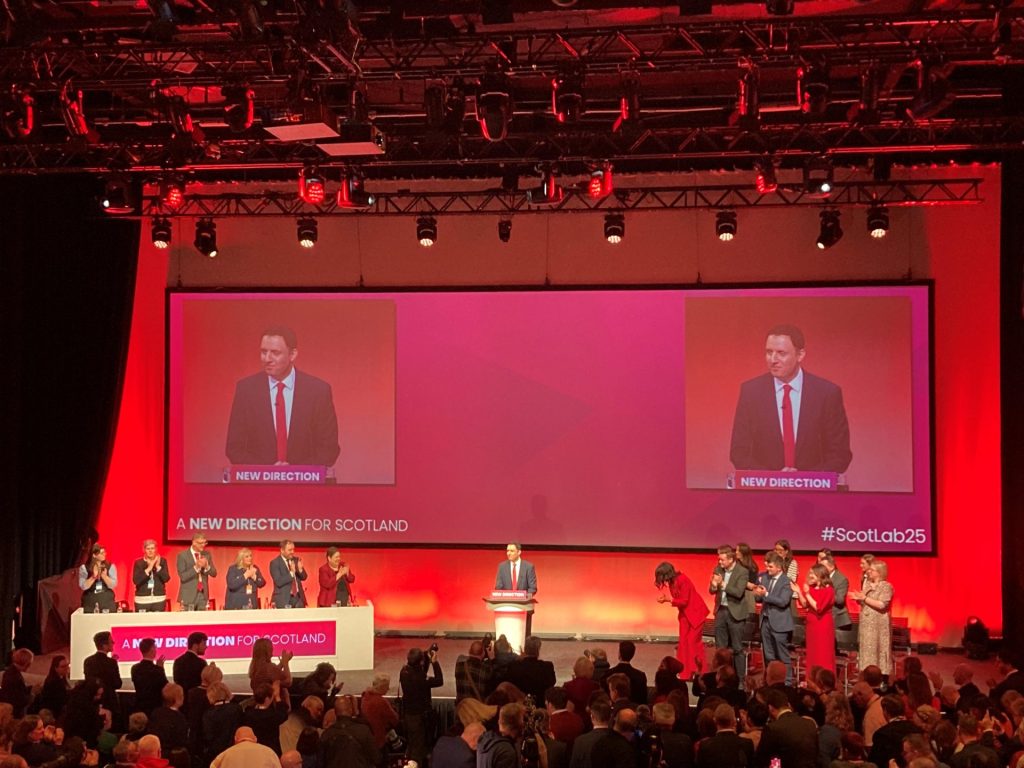5 takeaways from the Scottish Labour Conference 2025
24 February 2025
This weekend, the Labour Party gathered in Glasgow for its annual Scottish conference. Despite achieving a superb result north of the border in last year’s General Election, the mood at the conference was coloured much more by the current polls which suggest the SNP is on course to once again emerge as the largest party at next year’s Holyrood elections.
I spent the day at the conference on Friday, attending fringe meetings and watching Anas Sarwar’s keynote speech in the conference hall, before attending our H/Advisors Cicero dinner which brought together five of Labour’s 2024 intake of MPs with guests from business and the media. While our dinner was held under the Chatham House rule, here are my five key reflections from the day as a whole and what they tell us about where Labour is at both in Scotland and across the UK.
1. Optimism has been tempered but not extinguished
The Scottish polls have shifted, and the SNP is back on top. Nevertheless, there is still belief that Labour can win in 2026. The need to be more clear about the achievements of the UK Labour government came up time and again – the increased minimum wage, employment rights, GB Energy and a record funding settlement for Scotland to boost investment in public services were the policies most frequently cited by Labour Parliamentarians. In addition, Labour clearly recognise that they need to shift the narrative ahead of 2026 to remind voters who the real incumbents are in the Scottish elections. Painting the SNP as “tired” and “out of ideas” after two decades in office will clearly be a central pillar of Scottish Labour’s campaign as it seeks to replicate the “time for change” narrative that worked effectively in 2024. Labour also remains confident in the quality of their digital and ground operations and are likely to be able to outspend the SNP next year.
2. Anas Sarwar is a major asset but needs the right message
Almost everyone you speak to at a Scottish Labour gathering agrees that Anas Sarwar is a politician with the slightly intangible “star quality”. He is a gifted speaker and has a way with people, whether voters, colleagues or journalists. His speech on Friday, however, felt a little light, both on policy and an overarching vision. There were some potentially popular announcements – for instance on scrapping peak rail fares and a commitment for GP appointments within 48 hours – and some effective attack lines on SNP waste and incompetence. He framed the speech as his “application for the post of First Minister”, but at this stage, it didn’t yet feel like there is a fully formed pitch to voters. That’s not too big a problem for now but refining the message in the next 12 months will be vital.

3. Reform UK is on people’s minds
Neither UKIP nor the Brexit Party ever made any serious inroads in Scotland, but there is concern that Reform could. In polls, Reform is more or less tied with the Conservatives in third place in Scotland, and numerous MPs reported that the issues being pushed by Reform – most notably around migration – have begun to be regularly cited on the doorstep in their constituencies. The lack of leadership or infrastructure in Scotland for Reform would appear to be a barrier, but on the other hand their digital targeting is clearly effective and achieving cut-through. In a fringe meeting on Friday, Pat McFadden, Labour’s 2024 election coordinator, said that Reform cannot be allowed to get away with simply being “commentators” and that their policies (for instance on the future of the NHS) need to be put under the microscope. Squeezing the Reform vote will be a key objective if Labour is to close the gap on the SNP.
4. Independence is not on people’s minds
I’ve attended a lot of Scottish party conferences and other political gatherings over the last 15 years or so and I cannot remember one where independence was so rarely mentioned. Partly that’s because there is so much else going on both domestically and internationally, but it also reflects the relative lack of emphasis being placed on the subject now by the SNP. Even if John Swinney is able to lead his party to a win next year, it is unlikely to lead to any great renewed push towards independence, at least in the short term.
5. The Musk Effect was on show
While nobody was overtly mentioning Elon Musk as an inspiration, the announcement by Sarwar that he would establish a department for government efficiency in Scotland was telling. He highlighted that Scotland now has more quangos than MSPs. These themes were recurring in other meetings throughout the day. Pat McFadden spoke of the need for change in how the state works and ensure people get “more bang for their buck”. Other speakers highlighted that taxpayers do not want to feel that they are simply funding bureaucrats, while at our Cicero dinner we heard significant discussion of the role that technology can play in improving delivery in services like the NHS. Expect government efficiency and cutting down on waste to be a major theme for Labour both in Scotland and across the UK in the months and years ahead.
This was a fascinating conference and one that suggests there is still all to play for in the run up to 2026.
If you would like to talk more about our analysis, please do get in touch.
